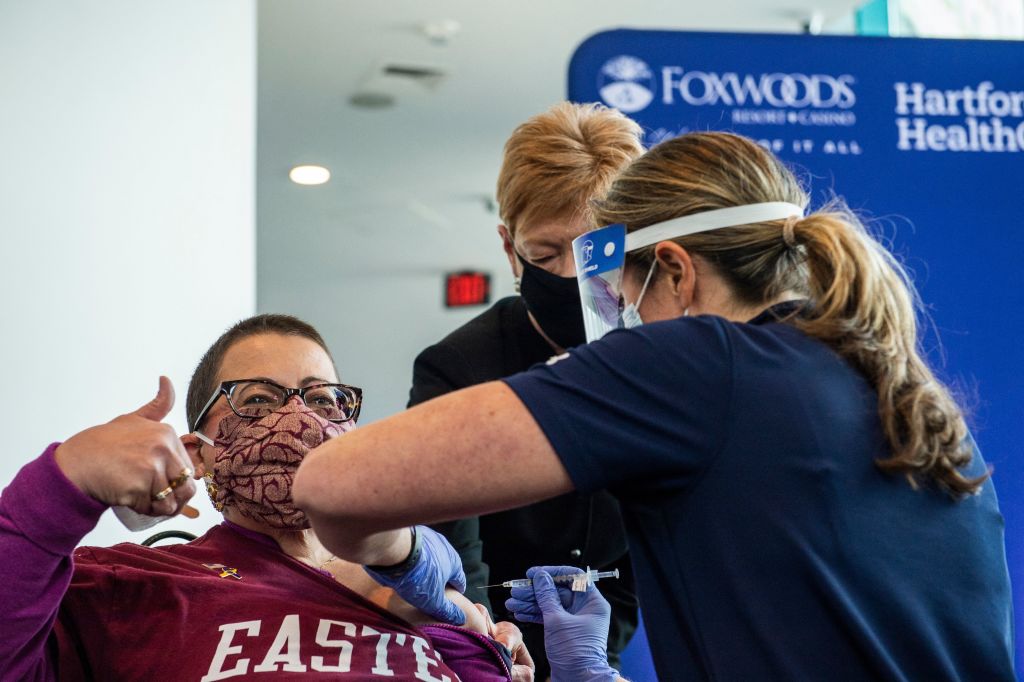1 in 4 U.S. adults has gotten a COVID-19 vaccine, plus other numbers from the vaccination effort


A free daily email with the biggest news stories of the day – and the best features from TheWeek.com
You are now subscribed
Your newsletter sign-up was successful
More than 60 million people in the U.S. have gotten at least one dose of COVID-19 vaccine and 31.3 million are fully vaccinated, the Centers for Disease Control and Prevention (CDC) reported Monday. The 92 million doses administered means 18.1 percent of the U.S. population has gotten at least one COVID-19 shot, and Andy Slavitt, a public health official who now works at the Biden White House, breaks that down by age group.
That means about 1 in 4 U.S. adults has been inoculated and 12 percent can now, the CDC suggests, resume some semblance of a normal social life. Here are some other numbers from the accelerating COVID-19 vaccination drive:
- 2.2 million COVID-19 shots now administered daily in the U.S., in the seven-day average
- 0 percent of Johnson & Johnson's one-shot vaccine included in the CDC's numbers as of Sunday night
- 44 percent of fully vaccinated U.S. adults, and about half of all adults, are anxious about re-entering normal life, according to soon-to-be published data from the American Psychological Association
- 25.8 percent of New Mexico's population has gotten at least one vaccine dose
- 15.8 percent of Alaska's population is fully vaccinated
- 13.3 percent of Georgia's population has gotten at least one vaccine dose
- 6.6 percent of Utah's population is fully vaccinated
- 100 percent of K-12 teachers are eligible to get vaccinated in the U.S. as of Monday — "though the situation is more straightforward in some states than others," The New York Times notes
- 312 million does (at least) have been administered worldwide in 116 countries, according to Bloomberg's tally.
The U.S. is making steady progress in its vaccination drive, Virginia Tech epidemiologist Lisa M. Lee tells The Wall Street Journal, but logistics continues to be the primary hurdle, "everything from secure and simple registration systems to directing traffic at large vaccination events."
The Week
Escape your echo chamber. Get the facts behind the news, plus analysis from multiple perspectives.

Sign up for The Week's Free Newsletters
From our morning news briefing to a weekly Good News Newsletter, get the best of The Week delivered directly to your inbox.
From our morning news briefing to a weekly Good News Newsletter, get the best of The Week delivered directly to your inbox.
A free daily email with the biggest news stories of the day – and the best features from TheWeek.com
Peter has worked as a news and culture writer and editor at The Week since the site's launch in 2008. He covers politics, world affairs, religion and cultural currents. His journalism career began as a copy editor at a financial newswire and has included editorial positions at The New York Times Magazine, Facts on File, and Oregon State University.
-
 How to Get to Heaven from Belfast: a ‘highly entertaining ride’
How to Get to Heaven from Belfast: a ‘highly entertaining ride’The Week Recommends Mystery-comedy from the creator of Derry Girls should be ‘your new binge-watch’
-
 The 8 best TV shows of the 1960s
The 8 best TV shows of the 1960sThe standout shows of this decade take viewers from outer space to the Wild West
-
 Microdramas are booming
Microdramas are boomingUnder the radar Scroll to watch a whole movie
-
 Trump HHS slashes advised child vaccinations
Trump HHS slashes advised child vaccinationsSpeed Read In a widely condemned move, the CDC will now recommend that children get vaccinated against 11 communicable diseases, not 17
-
 FDA OKs generic abortion pill, riling the right
FDA OKs generic abortion pill, riling the rightSpeed Read The drug in question is a generic version of mifepristone, used to carry out two-thirds of US abortions
-
 RFK Jr. vaccine panel advises restricting MMRV shot
RFK Jr. vaccine panel advises restricting MMRV shotSpeed Read The committee voted to restrict access to a childhood vaccine against chickenpox
-
 Texas declares end to measles outbreak
Texas declares end to measles outbreakSpeed Read The vaccine-preventable disease is still spreading in neighboring states, Mexico and Canada
-
 RFK Jr. shuts down mRNA vaccine funding at agency
RFK Jr. shuts down mRNA vaccine funding at agencySpeed Read The decision canceled or modified 22 projects, primarily for work on vaccines and therapeutics for respiratory viruses
-
 Measles cases surge to 33-year high
Measles cases surge to 33-year highSpeed Read The infection was declared eliminated from the US in 2000 but has seen a resurgence amid vaccine hesitancy
-
 Kennedy's vaccine panel signals skepticism, change
Kennedy's vaccine panel signals skepticism, changeSpeed Read RFK Jr.'s new vaccine advisory board intends to make changes to the decades-old US immunization system
-
 Kennedy ousts entire CDC vaccine advisory panel
Kennedy ousts entire CDC vaccine advisory panelspeed read Health Secretary RFK Jr. is a longtime anti-vaccine activist who has criticized the panel of experts
